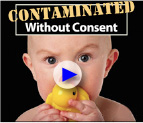Contact: Coming Clean, (802) 251-0203, info@comingcleaninc.org
Toxic BPA Contamination
Groups Support Consumer’s Union Call for FDA Protection From BPA in Canned Food
Consumer Reports Study Detected BPA in Some Canned Foods
San Francisco, CA — In response to Consumer Reports’ new report on contamination of canned food products with the synthetic sex hormone bisphenol A (BPA), the Breast Cancer Fund, Clean Water Action, Clean New York, Center for Health Environment, & Justice, Physicians for Social Responsibility, Oregon Environmental Council and other environmental health advocates support Consumer Union’s new report demonstrating contamination of canned food products with the synthetic sex hormone bisphenol A (BPA), which leaches from the can linings. The groups echoed the call for FDA to stop immediately act to protect consumers from BPA.
BPA is linked to neurological, endocrine and reproductive health effects, including breast cancer.
“The Consumer Reports report results are sobering, and confirm what we already know: that Americans are exposed to toxic BPA every day through canned food,” said Janet Nudelman at the Breast Cancer Fund. “A synthetic estrogen linked to breast cancer should not be in our food, period. It’s well past time to ban BPA from food and beverage containers.”
Bobbi Chase Wilding of Clean New York says, “More and more studies are demonstrating hazard from this chemical. But consumers should not have to read scientific journals to determine what is safe when shopping for their families. FDA needs to step up and step in.”
“Unfortunately, the chemical industry has already come out swinging, trying to refute some of Consumer Reports’ statements. If industry spent their time and energy formulating nontoxic can liners instead of spending it on public relations and confusing consumers this discussion would've been over long ago, and we'd all have less exposure.”
Mike Schade from the Center for Health, Environment, & Justice adds, “We know that there are companies which want to do the right thing. WalMart, Target, Babies R Us, Nalgene, Camelbac and others have been working provide their customers with safer, BPA-free products – the products consumers want. The time has come for the food industry to follow suit.”
Kristen Welker-Hood, ScD, MSN, RN, director of Environment and Health Programs, Physicians for Social Responsibility says, “Endocrine disrupting chemicals such as BPA are linked to systemic inflammation that contributes to the development of diseases including diabetes, cardiovascular disease , metabolic syndrome and hypertension. A critical step to decreasing the public health burden of these chronic diseases is to stop exposure to this chemical now.”
Consumer Reports product testing found that almost all of the 19 name-brand foods tested contain measurable levels of bisphenol A (BPA). The results are reported in the December 2009 issue and are also available free online at www.ConsumerReports.org
Consumers Union sent a letter to FDA Commissioner Margaret Hamburg requesting that they it move this year to ban the use of BPA in food- and beverage-contact materials.
Scientists from a broad array of groups, including Natural Resources Defense Council, American Association on Intellectual and Developmental Disabilities,Association of Reproductive Health Professionals, Green Science Policy Institute, Environmental Defense and many others sent a letter to FDA Science Board September 30th to ask for scientific integrity in the process of evaluating BPA for FDA. Nearly 40 advocacy organizations sent a similar letter as well. FDA has said it will be making an announcement on BPA’s health impacts by November 30th.
An FDA special scientific advisory panel reported in late 2008 that the agency’s basis for setting safety standards to protect consumers was inadequate and should be reevaluated. A congressional subcommittee determined in 2009 that the agency evaluation conducted by ICF Consulting used only studies sponsored by the American Plastics Council; the studies were also conducted by BPA manufacturers, who are clients of ICF Consulting.
The FDA is now under new leadership with Dr. Margaret Hamburg. Congress is currently considering legislation that would ban the use of BPA in all food and beverage containers.
Although some companies are working hard to substitute less toxic chemicals for BPA, industry trade associations and many companies have been attacking efforts to restrict the chemical.
Available for Interviews
- Sarah Janssen, MD, PhD, MPH is a Staff Scientist in the Health and Environment program at Natural Resources Defense Council, 415-875-6126. Dr. Janssen can address health effects linked to BPA exposure.
- Mia Davis, former Co-Coordinator, Workgroup for Safe Markets 617-338-8131, x201
- Janet Nudelman, Director of Program and Policy for the Breast Cancer Fund. To schedule an interview with Janet Nudelman, please contact Shannon Coughlin, 415-336-2246.
- Bobbi Chase Wilding, Organizing Director, Clean and Healthy New York, and National BPA Coordinator, Workgroup for Safe Markets, 518-708-3875.
- Mike Schade, Center for Health, Environment, & Justice. 212-964-3680.
- Richard A. Liroff, Ph.D., Executive Director, Investor Environmental Health Network, 703-532-2929. Rich can address the story of BPA manufacturer Sunoco refusing to sell its product to companies that make food products that might expose children to BPA.
- Naomi Starkman, Consumers Union, for report information: 917-539-3924 or
- Renee Hackenmiller-Paradise, MPH., PhD. Oregon Environmental Council, 503-222-1963, x110. Can address efforts in Oregon to restrict BPA.
Resources
- Consumers Union
- FDA relied heavily on BPA lobby Regulators actively reached out to industry
Milwaukee Journal Sentinel May 16, 2009 - Baby's Toxic Bottle Report (including BPA fact sheet)
Center for Health, Environment and Justice - Is It In Us? Biomonitoring study shows BPA contamination in the bodies of 35 people nationwide
- Chemical Offender: Bisphenol A
Breast Cancer Fund
# # #




